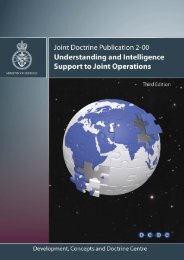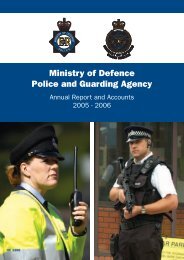JSP 464 - Ministry of Defence
JSP 464 - Ministry of Defence
JSP 464 - Ministry of Defence
Create successful ePaper yourself
Turn your PDF publications into a flip-book with our unique Google optimized e-Paper software.
ACCOMMODATION RELATED DEFINITIONS<br />
As at 13 Jul 12 1D-1<br />
ANNEX D TO<br />
CHAPTER 1<br />
1. Personal Status Categories (PStatCat). The personal status <strong>of</strong> Service personnel<br />
is defined by Personal Status Category (PStatCat). A list <strong>of</strong> PStatCat definitions can be<br />
found in <strong>JSP</strong> 752, Chapter 1 Section 4.<br />
2. Service Family Accommodation (SFA). Accommodation provided for Service and<br />
entitled civilian personnel with dependent families. It is normally provided by means <strong>of</strong><br />
Service Family Accommodation (SFA) or Substitute Service Family Accommodation<br />
(SSFA or hirings).<br />
3. Substitute Service Family Accommodation (SSFA). Where SFA is not available,<br />
privately rented accommodation will be provided, allocated and managed by the MOD<br />
Accommodation Agency contractor. The standards <strong>of</strong> accommodation will remain the<br />
same as those to which Service personnel are currently entitled within these regulations.<br />
4. Entitled Service personnel. Entitled personnel are guaranteed to be provided SFA<br />
or SSFA at the duty unit specified on their assignment order. To be entitled to SFA<br />
Service personnel within the UK and overseas must meet the criteria laid out at <strong>JSP</strong> 752<br />
Chapter 1 Section 4.<br />
5. Eligible Service personnel. Eligible personnel may apply to occupy temporarily<br />
surplus SFA only where it is available. To be eligible to occupy surplus SFA personnel<br />
within UK must meet the criteria laid out in <strong>JSP</strong> <strong>464</strong> Pt I Chapter 10 and, for those serving<br />
outside UK, at <strong>JSP</strong> <strong>464</strong> Pt II Chapter 9.<br />
6. Dependants. A dependant is defined as a spouse/civil partner or child <strong>of</strong> a Service<br />
person or entitled civilian who depends on him or her for support.<br />
7. Children. For the purposes <strong>of</strong> SFA allocation, a child is defined as ‘the natural child,<br />
or the adopted child <strong>of</strong> the Service person or his or her spouse, civil partner or other<br />
partner in respect <strong>of</strong> whom a Service Declaration has been made; or a child <strong>of</strong> the family 4<br />
who is below the age <strong>of</strong> majority (18 years <strong>of</strong> age). Unborn children, who are expected to<br />
be born within 6 months <strong>of</strong> occupation <strong>of</strong> SFA, are to be counted as members <strong>of</strong> the<br />
family. Exceptions to the age limit above are:<br />
a. Dependent children who are under age 25, unmarried and in receipt <strong>of</strong> full-time<br />
education at school, 6 th Form College, College <strong>of</strong> Further Education or an Institute <strong>of</strong><br />
Higher Education (eg University), studying up to and including 1 st degree level only<br />
and where the dependant child continues to reside with the parents in SFA, providing<br />
there is no more than a break <strong>of</strong> one academic year between the secondary and<br />
further education 5 .<br />
b. Children <strong>of</strong> any age who are physically or mentally incapable <strong>of</strong> contributing to<br />
their own support.’<br />
8. Other Occupants. Other occupants include non – dependant adult children, aged<br />
parents and full time nannies/au pairs for whom permission has been granted by DIO Ops<br />
4 A term meaning any other child who is being brought up in the household <strong>of</strong> the husband/wife at his/her expense, or was so brought<br />
up immediately before the spouse/civil partners were estranged, separated by legal order, divorced or before their marriage was<br />
annulled or before the death <strong>of</strong> the wife/husband/partner. e.g a child for whom one is a legal guardian.’<br />
5<br />
The academic year is defined as the period between the last day <strong>of</strong> the summer term and the first day <strong>of</strong> the winter term in the<br />
following year (for example Jul 03 – Sep 04).


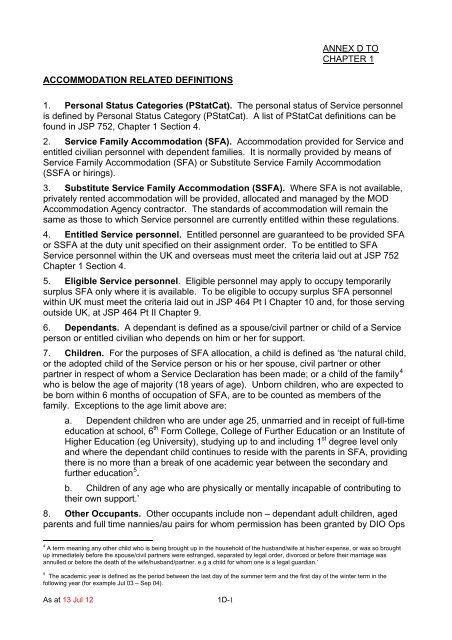
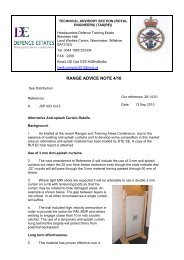

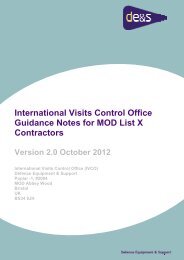
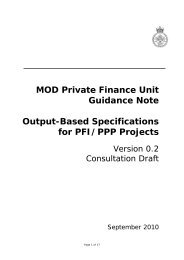

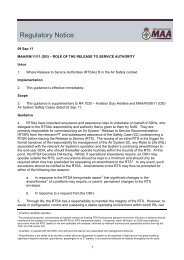
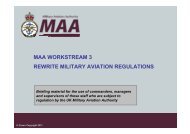
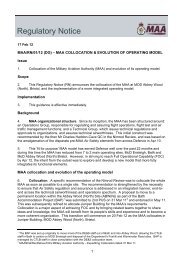
![MAA Regulatory Publications - FAQs PDF [37.3 KB]](https://img.yumpu.com/5906104/1/184x260/maa-regulatory-publications-faqs-pdf-373-kb.jpg?quality=85)
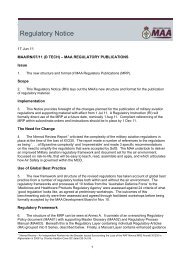
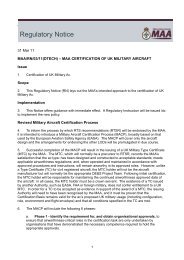
![3750 edition 6 PDF [263.5 KB] - Ministry of Defence](https://img.yumpu.com/5901071/1/184x260/3750-edition-6-pdf-2635-kb-ministry-of-defence.jpg?quality=85)
